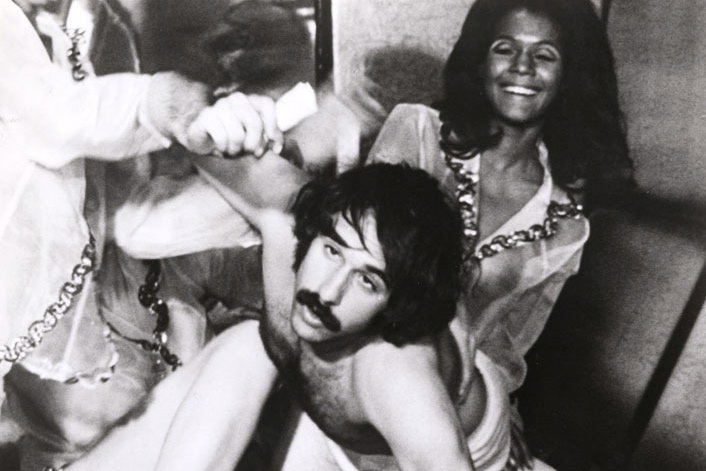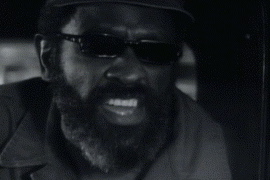(Putney Swope is available on DVD from Amazon. From September 12th through 18th, Anthology Film Archives in NYC will be showing four very rarely screened—and unavailable on video—’60s and ’70s films written and directed by Robert Downey, Sr. As a tribute to this American original, H2N presents this introduction to his best-known movie, the immortal Putney Swope.)
“We’re all such pussies,” a filmmaker friend said to me recently after seeing Robert Downey, Sr.’s 1969 satire Putney Swope for the first time. I knew exactly what she meant. It’s hard to imagine any director making a movie like this today. Not that there’s any shortage of talented mockers and ironists at work: Stewart and Colbert, Chappelle’s Show, Borat, South Park, Election, and more—the last several years may have been lousy ones for America, but they’ve been good ones for American satire. Still, nothing currently on the air or in theaters quite matches Swope for sustained audacity and originality. Almost forty years after the movie’s release, its outrageousness continues to leave audiences sputtering with laughter, and young filmmakers feeling liberated and inspired.
Putney Swope (Arnold Johnson) is a middle-aged black man on the board of directors at a white-bread Madison Avenue advertising agency. When the agency’s chairman keels over during a board meeting, the members vote to determine who will succeed him. All of them believe that no one else will vote for Swope, so they all do so, each thinking that will cancel out the other votes and leave the way clear for them to take over; instead, Swope wins in a landslide. He fires the board, replaces them with a ragtag band of black radicals, and renames the agency Truth and Soul, Inc. Soon, the pressure is on Swope to put the company at the service of the revolution. Will power corrupt him, or will he stay true to the cause? And is the cause a worthwhile one in the first place, or is Black Power just another brand name to be pimped for profit? Paul Thomas Anderson said that seeing Swope showed him “you could be really punk rock in a movie. You could do anything: it didn’t have to make sense. As long as it was funny, or funny to the guy who was making it, it would come across as exciting.” Anderson’s comparison to punk gets across something of Swope’s anarchic energy, as well as its rough, slapdash quality. The scenes play like a series of absurdist comic sketches strung together on a raggedy clothesline of a plot, and the mise-en-scène seems almost willfully amateurish: plonk the camera down in a corner of the room and see what kind of crazy shit you can throw in front of it. But there’s expert comedic craftsmanship in the film’s timing and pacing. And holding it all together, as Anderson saw, is Downey’s unique American-surrealist sensibility.
Paul Thomas Anderson said that seeing Swope showed him “you could be really punk rock in a movie. You could do anything: it didn’t have to make sense. As long as it was funny, or funny to the guy who was making it, it would come across as exciting.” Anderson’s comparison to punk gets across something of Swope’s anarchic energy, as well as its rough, slapdash quality. The scenes play like a series of absurdist comic sketches strung together on a raggedy clothesline of a plot, and the mise-en-scène seems almost willfully amateurish: plonk the camera down in a corner of the room and see what kind of crazy shit you can throw in front of it. But there’s expert comedic craftsmanship in the film’s timing and pacing. And holding it all together, as Anderson saw, is Downey’s unique American-surrealist sensibility.
Putney is a very dialogue-driven film, and what weird, wildly original dialogue it is—no other movie sounds like it. Talking heads jam themselves into the frame at unorthodox angles, jabbering away in rapid-fire volleys of jive patter, political sloganeering, and corporate jargon. Nonsense phrases are repeated, Tourette’s-like, by the actors until they take on a freakish incantatory power. For those who are already dues-paying, Kool Aid-swigging members of the Putney Swope cult, just hearing one of the movie’s catchphrases is enough to set off a fit of demented giggling: “How many syllables, Mario?” “Stratosphere, baby, stratosphere!” “Putney says the Borman 6 girl is got to have soul!” And the sublimely unforgivable pièce de résistance: “It’s cold in here. Throw another Jew on the fire!” (If you’re offended by reading that line, just wait until you hear it delivered on-screen: the speaker is a German auto executive who’s sharing a joint with the President of the United States and the First Lady. The latter two are played by midgets.) And yet there’s a method to all this madness. The main satirical device Downey employs throughout Swope is the reversal or inversion of standard racial tropes: the token white employee who’s paid less than his black co-workers, the white delivery boy forced (at gunpoint) to take the service elevator, the blond maid abused by her black employer, the white teenage “orphan” who asks Swope to adopt him (”Whatever you decide, don’t do it out of guilt”). Stereotypes are flipped on their heads, but the implication is not so much that Prejudice Is Bad, as that people will be cruel and craven no matter what side of the power dynamic they occupy. Swope and his team set out to transform the advertising industry in the name of social justice, but before long they’ve been thoroughly co-opted, peddling the same old crap as before—the only difference now is that black people are the ones doing the peddling. (As the aphorist Logan Pearsall Smith once noted, “Those who set out to serve both God and Mammon soon discover that there is no God.”) Although the movie is too hip and too committed to the farcical mode to spell out an explicit message, Swope’s pessimistic conclusion hints at the limits of idealism in a world ruled by money and marketing, which makes it as relevant now as it was in 1969.
And yet there’s a method to all this madness. The main satirical device Downey employs throughout Swope is the reversal or inversion of standard racial tropes: the token white employee who’s paid less than his black co-workers, the white delivery boy forced (at gunpoint) to take the service elevator, the blond maid abused by her black employer, the white teenage “orphan” who asks Swope to adopt him (”Whatever you decide, don’t do it out of guilt”). Stereotypes are flipped on their heads, but the implication is not so much that Prejudice Is Bad, as that people will be cruel and craven no matter what side of the power dynamic they occupy. Swope and his team set out to transform the advertising industry in the name of social justice, but before long they’ve been thoroughly co-opted, peddling the same old crap as before—the only difference now is that black people are the ones doing the peddling. (As the aphorist Logan Pearsall Smith once noted, “Those who set out to serve both God and Mammon soon discover that there is no God.”) Although the movie is too hip and too committed to the farcical mode to spell out an explicit message, Swope’s pessimistic conclusion hints at the limits of idealism in a world ruled by money and marketing, which makes it as relevant now as it was in 1969.
— Nelson Kim












Daniel Puchalsky
President mimeo, the muslim, and the character played by Stan Gottlieb(the white dude who wants “in” once the power flips) are my favorites, in a a cast of absolute characters. Makes me laugh my ass off every time. Loved the review and your analysis.